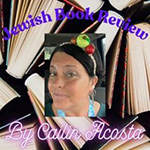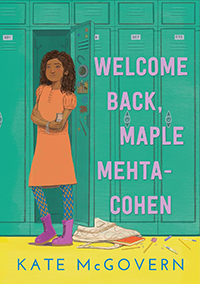Welcome Back, Maple Mehta-Cohen: A Story for Anyone Who Has Ever Felt Different by Kate McGovern; Melrose Park, IL: Candlewick Press © 2021; ISBN 9781536-215588; 247 pages; PJ Library Our Way

 SAN DIEGO – Maple Mehta-Cohen had dyslexia and was forced to repeat the fifth grade, turning her life upside down.
SAN DIEGO – Maple Mehta-Cohen had dyslexia and was forced to repeat the fifth grade, turning her life upside down.
The words of “repeating fifth grade” rang in Maple’s ears and her parents were devastated. Having to tell her two best friends from preschool, Marigold and Aislinn that she was being held back was disheartening as well.
Maple’s school, The Barton School, has a lower school which ends at fifth grade and a middle school that starts at sixth grade. Marigold and Aislinn discussed all the changes occurring the summer before sixth grade, but Maple had not told her two friends the truth.
Fifth grade started and Maple was in Ms. Littleton-Chan’s class again. A new student joined the class named Jack. Maple and Jack became close friends and were in the same reading group. When classmates started asking Maple, a persuasive storyteller, why she was in the reading group, she told them that she was asked to stay in Ms. Littleton-Chan’s class to be a tutor. But shortly after convincing the class, it was apparent that Maple could not read.
Maple missed her sixth-grade friends and attended Aislinn’s sleepover party even though she was not officially invited. During the party, Aislinn recorded Maple trying to read the back of a book Aislinn received as a birthday present. She struggled to sound out the words. During the school announcements, the Barton anthem was replaced by the recording of Maple trying to read. Maple’s fifth grade class now knew the truth that she was not a tutor but was repeating fifth grade.
Maple referred to herself as a Hin-Jew, half Hindi and half Jewish. For her birthday, she got a charm bracelet embracing her different cultures with a Star of David, an elephant for the Hindi god for Ganesha, and a maple leaf since her name is Maple. She gave this charm bracelet to Aislinn who didn’t want it. Aislinn turned out not to be a good friend as she struggled with dealing with her parents’ divorce.
Despite the horrific news of having to repeat the fifth grade, Maple was resilient. I found myself hoping she would make huge improvements so that she could be moved up to sixth grade.
This is realistic fiction, recommended for ages 9-12 years old.
*
Cailin Acosta is the assistant editor of San Diego Jewish World.
Two of my seven grand children are neurodivergent girls. I wish I had had a book like this to give them when they were that in that age group.